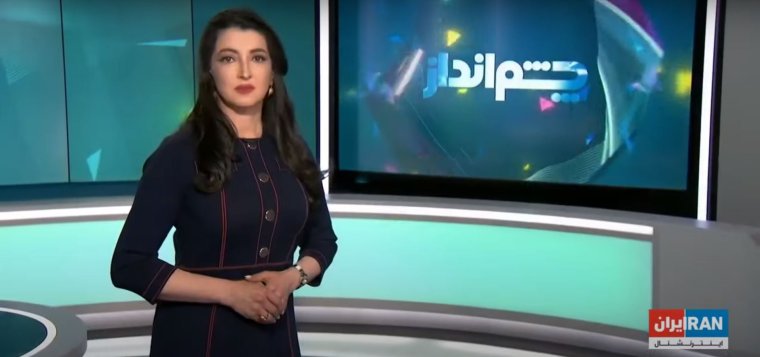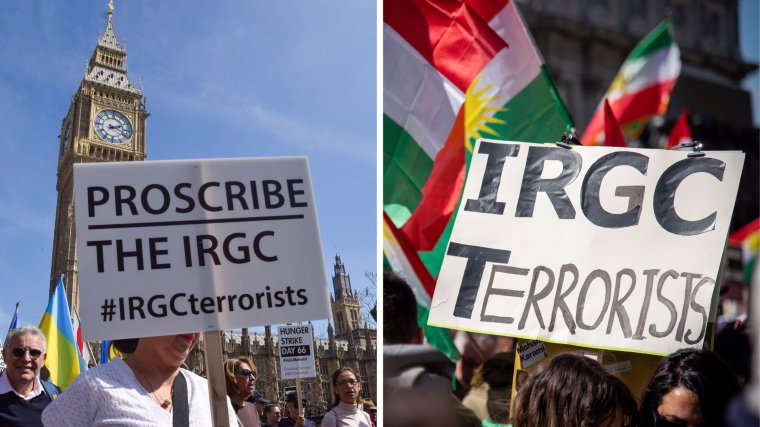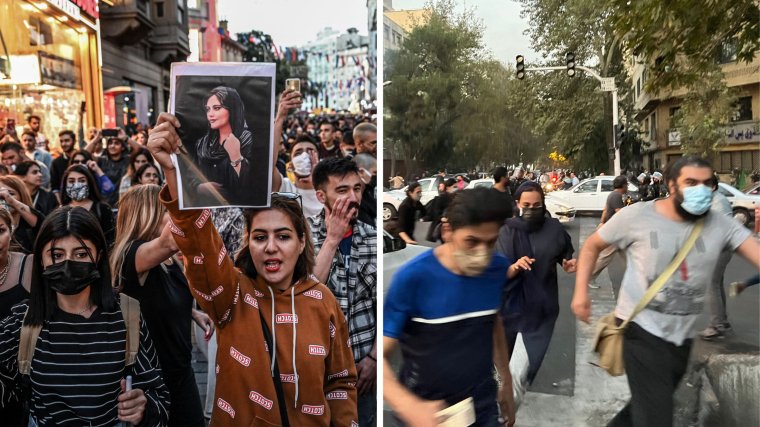She survived a plot to kill her on the streets of London. Her colleague is lucky to be alive after being stabbed outside his home in Wimbledon. Threats of rape and murder are sent to her – and many of her associates – every day.
So how, asks Sima Sabet, can the Government refuse to label the people responsible as terrorists?
Sabet is a renowned journalist who until recently worked at the UK-based news channel Iran International, which is popular in Iran for its damning stories about the country’s ruthless regime.
A terrifying plot to assassinate her in the British capital was uncovered last year. Evidence suggests it was planned by Tehran’s Islamic Revolutionary Guard Corps (IRGC), which the Iranian embassy rejects.
Its diplomats also deny responsibility for the attack on her fellow presenter Pouria Zeraati in London last month.

But Sabet and many other members of Britain’s Iranian community are furious at the UK for not proscribing the IRGC, given its widespread blame for a decades-long campaign of violence and intimidation against opponents in the UK and around the world.
“The IRGC is allowed to operate freely in the UK and come that close to killing a journalist,” she tells i. “They’re not going to stop harming us here in the UK. But the question is: are we protected?”
“Apparently, the British Government doesn’t want to take a very strong stand against their operations inside the UK. Which is a pity, because by not showing any strong reaction, those will continue,” adds Sabet, who is now freelance.
“Are we going to deter it? Are we going to stop it? Or do we have to wait for another person to be stabbed or killed tomorrow?”

Several other British-Iranian dissidents who fear for their lives after sinister harassment tell i they share Sabet’s frustrations.
They also warn that any member of the public could be caught in the crossfire of the political violence aimed at them.
The Government has so far resisted proscribing the IRGC because of its important links to the top of the Iranian regime.
The Prime Minister feels that officially calling it a terrorist organisation – leading to many political and financial ramifications – might curtail the UK’s ability to communicate diplomatically with Tehran’s leadership.
It may result in the UK embassy in Tehran being shut down, which would remove “one of our most effective channels for avoiding escalation”, Rishi Sunak’s spokesperson said this week.

The timing would be hugely sensitive right now, as tensions between Israel and Iran remain high after Tehran’s drone and missile attack last weekend. Despite a limited missile strike by Israel on Iran on Friday morning, fears remain of the war in Gaza escalating into a wider conflict.
The UK Government has sanctioned the IRGC and key leaders. One of those sanctions has been placed on Mohammed Ansari, an IRGC official named in the investigation into the alleged plot to kill Sabet.
But Sabet – who was born in Iran and moved to the UK in 2004 – says this isn’t effective and dismisses the Government’s reasoning for caution.
“These diplomatic channels have been open and that didn’t produce any results in terms of limiting their operation on UK soil. So what is the benefit?” she asks.
“If you have a diplomatic relationship with a state, it has to appreciate and value the channel that is open for them. By sending operatives here to kill UK nationals, this shows that they don’t have any respect for that.”
The IRGC and Iran’s shadow state
- To anyone who isn’t familiar with Iranian politics, the name “revolutionary guard corps” may give the impression that the IRGC is an army regiment like the UK’s Coldstream Guards, or perhaps a special forces unit like the SAS.
- While it is indeed a paramilitary and intelligence organisation, it’s also far more than that.
- It was founded as “the ideological custodian of Iran’s 1979 revolution”, but evolved into “an institution with vast political, economic, and military power”, according to the US-based Council on Foreign Relations.
- It is sometimes described as Iran’s “shadow state” – with senior IRGC members inside the official government where they act to control it, sometimes criticise it, and often exert their own extensive powers outside of it.
- Instead of serving the country’s president, the IRGC answers to the unelected supreme leader, Ayatollah Ali Khamenei, who has ruled Iran since 1989. It is also said to have fixed or heavily manipulated several presidential elections and is often accused of widespread corruption.
- It was proscribed as a terrorist organisation by the US in 2019 and also by Sweden, Bahrain and Saudi Arabia. The American government says that it conducts “covert lethal activities outside of Iran, including asymmetric and terrorist operations”.
“Are we going to stop it? Or do we have to wait for another person to be stabbed or killed tomorrow?”
Sima Sabet

A murderous plot
Iranian agents based in Syria referred to their plot against Sabet as “the wedding”. They wanted to kill Sabet, who they called “the bride”, as well as her colleague Fardad Farahzad, “the groom”, to show critics that they “could do harm to them at any time”.
They offered a people smuggler $200,000 (about £160,000) to “finish them” using a “kitchen knife” outside their London studio in 2022, an ITV investigation revealed in December.
Fortunately, the smuggler was a double agent working for an unnamed Western intelligence agency.
“First they wanted to attach a bomb to my car, but they thought it wasn’t possible,” Sabet says now. “Then they were instructing him to trap me in a lift or in a corridor, because I live in a secure building, and stab me.”
The plan was formed while the oppressive regime was desperately trying to stop protests in favour of women’s rights. These followed the death of 22-year-old Mahsa Amini who had been arrested by the “morality police” for not covering her hair with a mandatory hijab.
Iran International covered the demonstrations extensively. The channel particularly angers Tehran because it receives funding from its arch rival, Saudi Arabia.
The regime attempts to jam its transmissions, Sabet says, but the station uses multiple satellites to maintain signal.
Sabet’s show aired at Iranian prime time, 9pm in Tehran, and she says that two polls indicate it was the most watched Farsi-language programme.
“They were instructing him to trap me in a lift or in a corridor, because I live in a secure building, and stab me”
Sima Sabet

She has no doubt that Iranian state forces were behind the mission against her.
“They had published pictures of me, Pouria and three other journalists in a few cities. One was in the main square in Tehran. They called us ‘media terrorists’. One of the signs said, ‘Wanted dead or alive’, as if we are criminals.”
Sabet and her partner Saman Rasoulpour, a former senior editor at Iran International, had already tried to reduce exposure to potential risks. “I knew that I was a target,” she explains. “Security wise, I changed everything. I’m not intimidated, I’m not scared, but I don’t want to be an easy target… It changes your life.”
She spent more than a decade at the BBC World Service and says that many of her former colleagues in its Persian team face the same “horrific” dangers.
“All of us reporting on Iran, it doesn’t matter which media we’re in, we are all experiencing some kind of intimidation: family harassment, online harassment, assaults.”
After the operation to kill her failed, it was inevitable that her enemies would try to hit Iran International’s team again, she believes. “When the Islamic Republic puts a finger on someone, they won’t stop until they get their revenge.”
She escaped another potential attempt to harm her in February 2023. “I was confronted on the street by someone who was banging on my car. They were trying to get in but it was locked.”
The channel reluctantly closed its London office the next day and began broadcasting from the US instead, believing that the risks to its staff had become too great.
Its general manager, Mahmood Enayat, said at the time: “I cannot believe it has come to this. A foreign state has caused such a significant threat to the British public on British soil that we have to move.”
They eventually moved back last September and are broadcasting from the UK again.
“I’m not intimidated, I’m not scared, but I don’t want to be an easy target”
Sima Sabet

Calls for terrorist designation
Zeraati was stabbed in the leg on 29 March by three unidentified men, who fled the country on a flight out of Heathrow. Police reportedly believe they were Eastern European mercenaries.
He is recovering well and was back on air within days but is staying at a safe location under police guard.
Zeraati, 36, is also calling for the IRGC to be proscribed. “Killing people outside Iran, taking US, British and European citizens as hostage… it shows they can be considered as a terrorist organisation,” he told the BBC this week.
Sabet says she was advised by the police to leave her home after the attack on her former colleague. When she heard the news about Zeraati, her overriding emotion was anger. It still is.
“If they could send operatives to the UK, successfully stab a journalist, then go to Heathrow and fly out of the country, there is a serious question about the security here and how much it can be tolerated.”

She has shared a letter regarding her case with i, sent by the security minister Tom Tugendhat to her local MP, Labour’s Tulip Siddique.
Acknowledging the “unprecedented threats from the Iranian regime”, Tugendhat says that Tehran “has established a pattern of this type of behaviour which is totally unacceptable, yet typical of the regime and its lack of respect for basic rights”.
“We do not tolerate threats to life and intimidation of any kind towards individuals in the UK,” he states.
To counter “Iran-linked threats”, he promises to use “any and all means available across government”, being prepared to use “all tools at our disposal”.
Sabet argues that the Government’s actions show this isn’t true.
“He’s recognising the threat of IRGC on UK soil,” she says. “If a group is committing terrorist activities in the UK, how on earth can tolerating such activity produce a deterrent?”
A Government spokesperson says: “The UK Government, law enforcement and our international partners continue to work together to identify, deter and respond to threats from Iran.
“We will continue to take strong action against Iran while they threaten people in the UK and around the world. The UK has sanctioned more than 400 Iranian individuals and entities, including the IRGC in its entirety.”
“If a group is committing terrorist activities in the UK, how on earth can tolerating such activity produce a deterrent?”
Sima Sabet

But Sabet argues that sanctions achieve little.
“These people would never come to the UK, they don’t have anything in the UK to be seized,” she says. “They have unlimited passports with different names, so having their name banned [from travel] is not going to change anything you do. They sit in Tehran and they send their assassins everywhere.”
In December, MPs voted for the Government to proscribe the IRGC but it was not a binding motion.
Sir Iain Duncan Smith, the former Conservative leader, says the Government’s claim of wanting to maintain diplomatic links is a “poor excuse”.
Sabet believes that special attention needs to be paid to the IRCG’s elite Quds Force, which is in charge of overseas missions and has links to Hamas.
“These are the ones who hire assassins, who fund terrorism, who bomb everywhere. These are the ones who are involved in the conflicts in Yemen, Syria, Palestine, Lebanon, Iraq. How many British soldiers lost their lives from the bombs that they were planting with the Shia militia groups there?”
Although she can never truly think of herself as safe in London, Sabet is grateful for the freedoms she has in the UK compared to her compatriots back home, where the regime maintains order through torture and executions.
Not only that, but international sanctions on the country hurt the people more than its corrupt leaders, she says.
“The sanctions harm Iranians in totality, but IRGC at the moment is waging war in a few countries. They are paying for the war in Yemen. They are paying for the war in Syria, they are helping Hezbollah in Lebanon, they’re helping Hamas in Palestine. They are paying for all those Shia militias in Iraq.
“That is all Iranian money, at the expense of people getting poorer and poorer. So many Iranians are living below the poverty line… We are talking about perhaps billions of dollars here. They take the money and Iranians have no say, they just experience the hardship.”

